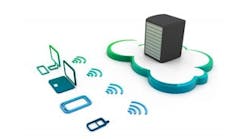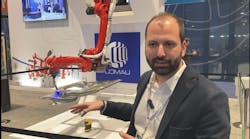This article was published in our 2014 Q2 issue of Industrial Networking along with our cover story "BYOD Gains Traction as Employees Demand Access from Mobile Devices."
Employees throughout the industrial enterprise want to remotely access all types of corporate data. This BYOD trend is here to stay, and IT departments need to provide convenient yet secure methods to access data through smartphones and tablets.
"The use of enterprise file sync-and-share applications has seen tremendous growth in the past year," notes Jeetu Patel, general manager for EMC Syncplicity. Syncplicity is a software platform for secure data and file sharing from the enterprise to mobile and other devices. "A December 2013 ESG report noted that 42% of organizations have IT-sanctioned and company-funded data- and file-sharing applications, a sizable increase from 28% just one year earlier. Clearly, the promise of these platforms—secure and easy viewing, sharing and editing of enterprise content—grabs the attention of forward-looking organizations seeking to enhance workforce productivity."
Patel has seen three distinct evolutionary stages in enterprise data and file sharing:
Stage 1: Convenience at Any Cost
Employees simply use their existing Gmail, Twitter, LinkedIn and other apps to share corporate data through the public cloud. This presents a security problem as most organizations do not want their employees storing critical data in the public cloud.
Stage 2: Security Brings the Hammer Down
As the pain of Stage 1 becomes clear, IT departments quash the use of purely public platforms, and force users to adopt older, more traditional file sync and share or FTP solutions that are slow, clunky and difficult to use. Users rebel, taking matters into their own hands by downloading banned data and file-sharing solutions, essentially returning the company to the first stage.
Stage 3: Hybrid Cloud Reconciliation
In this stage, IT realizes it can securely deliver and share data with devices with a hybrid cloud, which can be an on-premises server farm, a closely controlled off-premises cloud or a combination. Applications running in the hybrid cloud offer users fast and easy-to-use data access and sharing via smartphone and tablet apps or browser-based access. IT can enforce strict policies on who can access what data and documents when and where, ensuring that security policies are enforced.
"By integrating Syncplicity with EMC Documentum Capital Projects solution, part of the EMC Documentum Engineering, Plant and Facilities Management suite, local and remote users can share and sync project information and engineering documents," explains Sean Baird, leader of energy and engineering industry solution marketing for EMC's Information Intelligence Group.
"These platforms, in some cases combined with our hybrid cloud storage, integrate with mobile devices," he adds. "This lets engineering, procurement and construction companies, owner operators, contractors and suppliers easily access project content, streamline transmittals, participate in workflows, approve with electronic signatures and securely share content between organizations, with Syncplicity's support for mobile devices, while on the go."




